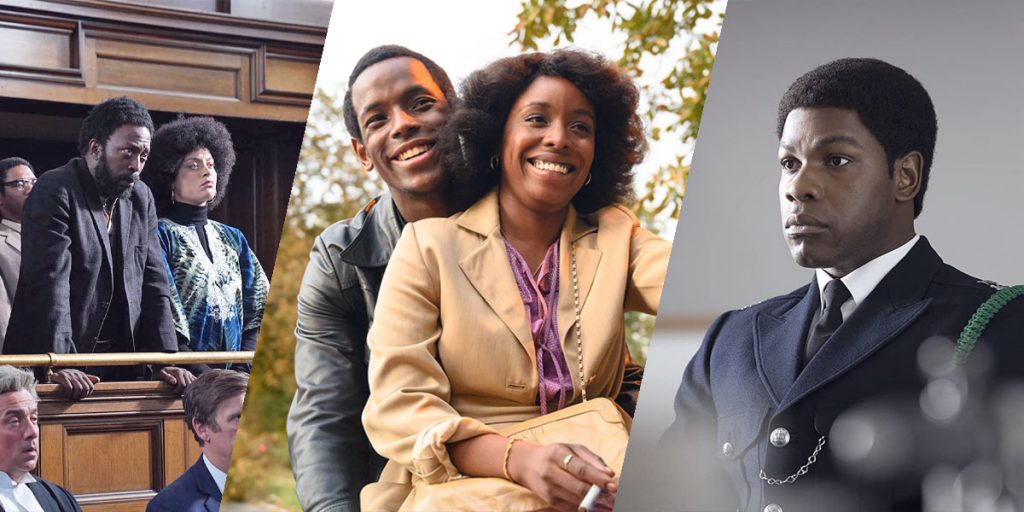Small Axe, a series of films depicting the London West Indian community in the 60s-80s, is on its way to standing as the greatest anthology film series ever.
Director Steve McQueen has elected to use his clout to make a series of films depicting the West Indian community in London from the 1960s-1980s. The series’ title, Small Axe, comes from a Jamaican proverb: “if you are the big tree, we are the small axe”, speaking to the stark effect marginalized voices can have when deployed properly. Three of the five films premiered at the New York Film Festival this year: Lovers Rock, Mangrove, and Red, White and Blue. Let’s take a moment to discuss each of the films and then what they mean when taken together.
MANGROVE
SMALL AXE, EPISODE 1
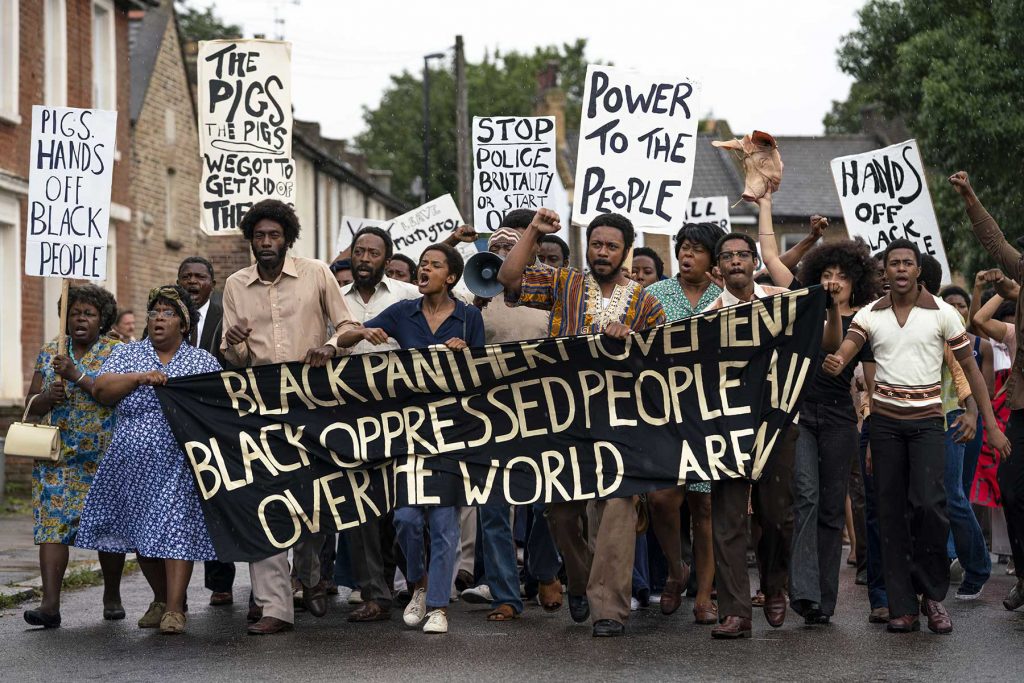
My favorite of the series, and I gather the “first” film in McQueen’s story, is Mangrove. The film tells the true story of a bar in the West Indian community tormented by racist officers. Fed up with the constant harassment, the community rallies to march in protest of the treatment they are experiencing at the hands of local officers. Invariably, this protest runs into conflict with the police and numerous protestors are arrested.
The film brings a stark focus on the minutiae of the trial of the various protestors. There is much to discuss in this masterwork, but I can’t deny my day job as a lawyer and I feel compelled to discuss the way the trial is brought to life by McQueen. For once, a film has nailed it. So many times, in courtroom dramas, witnesses on cross examination wilt under a few pointed questions and admit the crime, or brutally slip-up and ruin a case.
It’s silly and divorced from the reality of a real trial. In real life, if you don’t have a document to prove a witness is lying your wiles will not magically make them repent their deceptions. Rather, a savvy examiner is going to listen closely to the story a witness tells and dissect the details of a story. Did the witness initially state they were 50 feet away and then moments later describe hearing a whispered conversation? That sort of impossibility is the savvy cross examiners catnip. A truly great litigator turns a witness’ half-truths into miniature grand comedies.
Perhaps the only English language film to really get this concept is My Cousin Vinny. The examinations in the movie are hilarious, but largely because it follows the basic rules of good cross examination: find the inconsistencies and then hammer. Only ask questions that put an answer in the witnesses’ mouth so that the cross becomes about the lawyer and not about the witness. A truly great cross examiner delights when a witness says anything more than yes or no to a question because it creates fodder for a more thorough examination. I’ve never seen a movie capture the power dynamic like Mangrove. I can only imagine that much of the film’s courtroom drama arises from the actual transcripts as the cross examinations here are not only breathtaking in their accuracy (and acumen) but they hit a point of true thematic resonance.
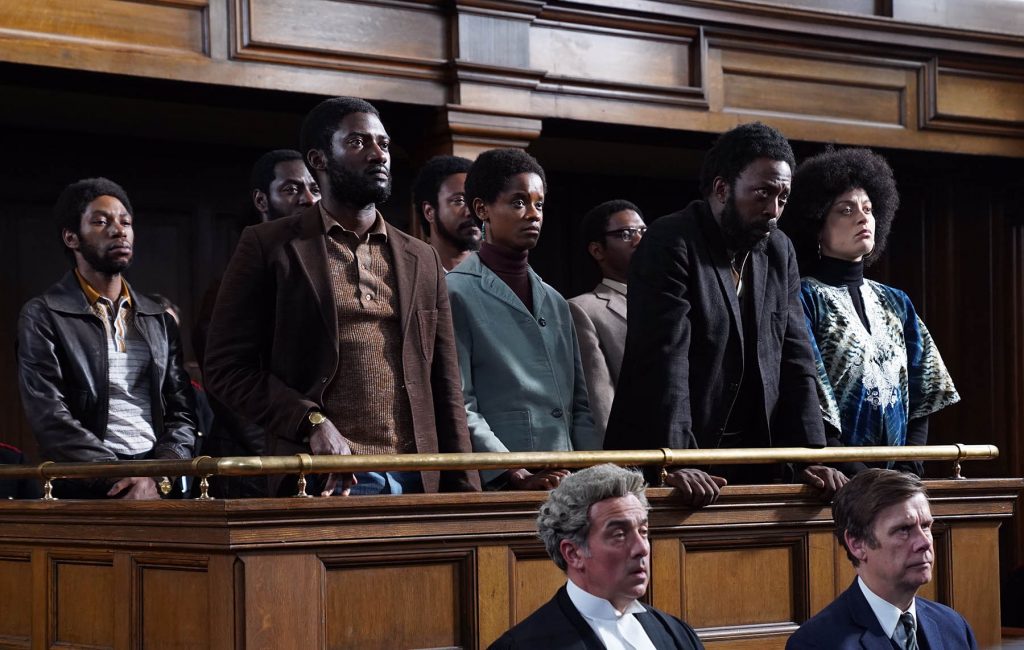
Perhaps lost in the misery of 2020 is that, in the abstract, Courts should be places of justice, not politics. The goal of a legal proceeding is to arrive at truth and to find a just outcome. To see the protestors (here largely serving as their own counsel with the sage advice of a barrister in support) quite literally seize justice from the very words of police officers is utterly rousing. That Mangrove is a true story makes it all the more resonant. The simple truth, the ability to listen, and some rhetorical wit are all that is required to see these people make justice for themselves. There is no message I needed to see more in a film this year than this.
I do not want to undersell the film’s merits to someone who will view from a lens far less focused on lawyerly tactics. McQueen beautifully introduces and establishes a large cast of characters very quickly, but the leads really stand out. In a clever bit of meta-casting Leticia Wright, most famous for her role as Shuri in Black Panther, plays an actual black panther. Here, she’s allowed to exercise a degree of force and power in her performance that I did not realize she had in her acting arsenal – she’s superb. Shaun Parkes (Netflix’s Lost in Space) plays the Mangrove bar’s owner – a man who clearly has seen something in his life, but has come out with a deep sense of community and justice. He has an utterly dynamite presence. The real standout for me, and this is like picking a favorite child as I loved all these performances so dearly, is Malachi Kirby (best known from an episode of Black Mirror) as a social activist who helps cultivate the protests. The twinkle in his eye during his cross examination – the look of a man who has tried to effect change through his voice for years seeing it actually happen with his words – is a small moment I will not forget.
I take notes during most movies I watch: a memorable line here, a description of an effective shot there. My notes on Mangrove are not all that helpful in writing as they are basically just expression of the joy the film brought me. At one point, my notes read “the crosses are AMAZING”, then “Holy Shit the Cross Examination!”, then “SHURI EXPERT CROSS!”. As someone who does criminal defense work, Mangrove scratched a special itch. I spent the hour after I watched the film texting all my law school and professional friends about the film’s greatness. I am confident that it will work just as well for non-lawyer viewers.
LOVERS ROCK
SMALL AXE, EPISODE 2
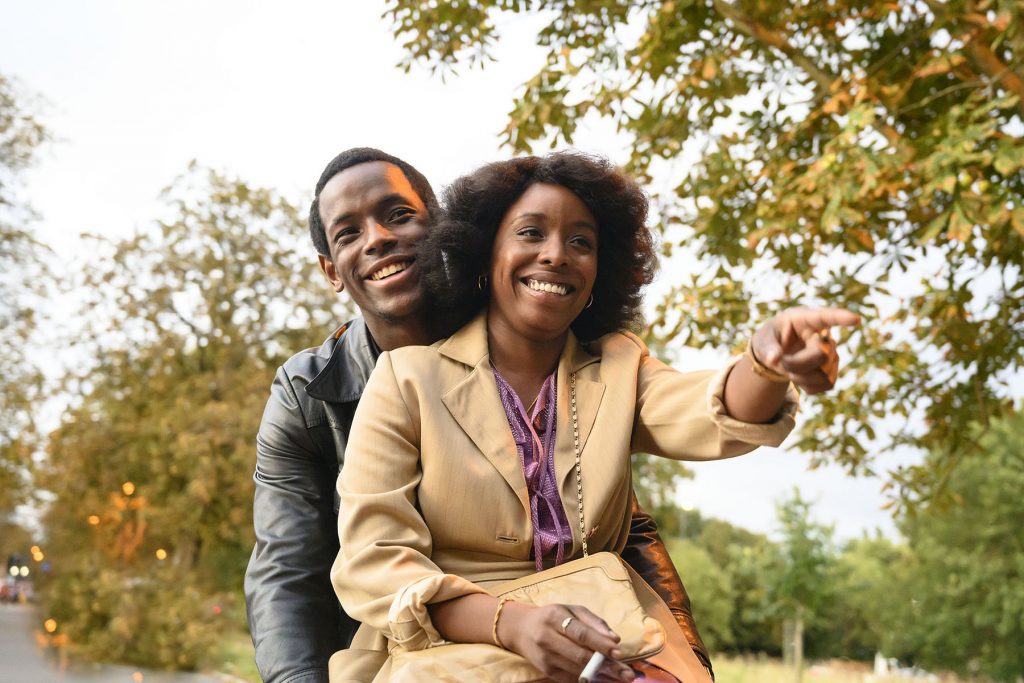
The second film in McQueen’s series is Lovers Rock. A few months ago, I reviewed an irrelevant little movie on Hulu called The Binge, a riff on The Purge where booze and drugs are allowed once per year. I wrote that films about parties are largely ineffectual because it’s so hard to capture the actual energy of a party – I’d rather be out having fun myself than watching other people have fun. Steve McQueen taught me the error of my ways – Lovers Rock is something special.
Telling the story of a house party in 1980’s Ladbroke Grove, Lovers Rock has the sort of vibrancy I cannot recall elsewhere from a film that is basically the story of a party. Imagine if the vibrant dance sequences of Gasper Noe’s Climax never devolve into chaos and murder, but rather become something life affirming. The film begins as the party does: the DJs show up to set up their space, the partygoers pay their cover, initial flirtations form. As the film progresses, McQueen slowly but surely heightens the energy of the party.
While the wonderful Amareh-Jae St. Aubyn and Micheal Ward (Blue Story) form the film’s core romantic pairing, McQueen is more concerned with capturing a moment of life affirming energy. Long takes are dedicated to dance sequences as the camera becomes an active participant in the party. When the DJ drops the needle of Carl Douglas’ “Kung Fu Fighting”, the film hits a gear of bringing a party to life I simply have never seen before. The song – goofy and antiquated as it may be in 2020 – has such energy and is danced with such joy by the cast that it becomes something of an anthem… until McQueen delivers the year’s best needle drop: Janet Kay’s “Silly Games.” I could not help but educate myself on McQueen’s process in making this movie and turns out that within the parameters of what songs would be player, the actors were largely given freedom to do as they wanted within each seen. During “Silly Games”, the party breaks out into a singalong that goes evolves enlivened to transcendent. It’s a moving sequence of communal connection and something truly remarkable.
I loathe to criticize something that gave me such joy, but I must admit that Lovers Rock is a bit formless and meandering (some may see this as a feature and not a bug). Many of the efforts to add more plot, such as neighborhood racists hassling partygoers, fall flat and feel distracting from the energy of the party. These complaints are not substantial when compared to something so lively.
RED, WHITE AND BLUE
SMALL AXE, EPISODE 5
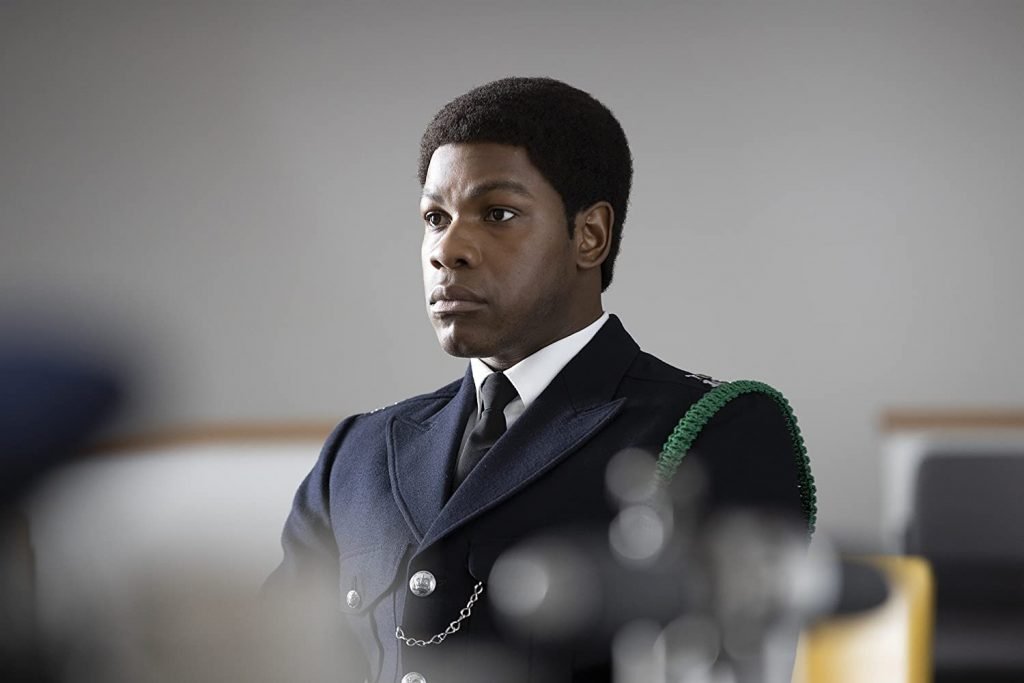
The final film screened is Red, White and Blue, which is actually the fifth film of the series (the third and fourth will debut on Amazon Prime in December). Set mostly in 1983, Red, White and Blue is inspired by the real life of a man named Leroy Logan who, despite a PhD and a job as a lab technician, decided that the best use of his talents is to join the police force.
That officer is played by John Boyega. Boyega is best known for his work in the recent Star Wars trilogy and has shown tremendous talent in smaller projects like Attack the Block and Detroit. Here, he is given his most fully realized role and gives the best performance of his career, and one of the best of the year. Boyega is someone who manages to maintain an almost staggering amount of emotion just an inch beneath the surface. Here, he feels like a constant powder keg, always on the edge of one more slight bringing about an explosion. And, when he does explode over overt abuse, it is sharp, focused, and downright scary. He has a level of intensity and gravity so few actors have today, and all without ever once appearing to chew the scenery. Comparing a black actor to “a young Denzel” is lazy and trite, but – let’s do it – Boyega here reminds me of a young Denzel. He has the sort of sense of righteous rage and screen dominating charisma that utterly captivates and defined Denzel’s ascent.
The film is brilliant in the way it depicts not only the specificity of the subtle – and overt – racism Logan faces, but in the way his new role on the other side of the blue wall changes his stature in the community. Logan’s captain has this utterly prickish way of waiting just a few extra beats before dismissing Logan from a meeting. It’s a power dynamic, deeply informed by race, that is depicted with just the right amount of restraint. The captain knows what he’s doing; Logan knows what the captain is doing; it is just subtle enough to exercise control without triggering an outright grievance. McQueen, however, is not interested in an easy condemnation of the police. It’s clear that McQueen views police as a necessary aspect of a functional society, albeit one that should not operate as it did (and still does). It is in examining this dynamic, primarily through Logan’s relationship with his father, a victim of unwarranted police brutality, that McQueen brings stark thematic depth to what would have been something less in a different director’s hands.
In terms of plot, Red, White and Blue is a fairly conventional narrative. A black man joins the police. He is forced to confront institutional racism. He is forced to deal with scorn from his community. Eventually, he makes a heroic arrest (here shown in a dynamite one-shot). But, in Leroy Logan’s life, and in McQueen’s vision of the police, there is no payoff. The police force is not magically less racist, rather the tension between Logan and his peers has never been greater. His relationship with the community, and his father, is left on a melancholic note. It is a brilliantly textured look at the complex relationship of black officers to their peers and their community.
It’s worth noting that Mangrove and Red, White and Blue are true stories, while Lovers Rock is an invention. I think it’s a smart thematic effort by McQueen to soften the thematic grind of the other films in the series with something focused on everyday life. It’s one thing to see racism in action in a movie, but it is perhaps something more important to show exactly who is harmed by that treatment. The abuse Leroy Logan receives is something everyone can understand, but why that abuse is so deleterious across an entire community is something McQueen deftly explores with Lovers Rock. There’s a small culture both apart from and restricted from the rest of London that these people are fighting to protect.
It is perhaps always folly to make broad proclamations about the relative quality of films I’ve seen once in the heightened excitement of the festival atmosphere (even if it’s only digital). And it is perhaps foolhardy to compare a series of films of which I’ve only seen 60% to the godfather of anthology films, but… if Education and Alex Wheatle live up to the quality of these first three films, then Dekalog may be on the cusp of surrendering the anthology throne. Any film fan should be over the moon that they’re going to get a masterwork from one of our greatest active directors for five consecutive weeks.
The Small Axe film series (Mangrove, Lovers Rock, Red, White and Blue, and Mangrove) is available to watch on digital and on demand. Watch Small Axe!

